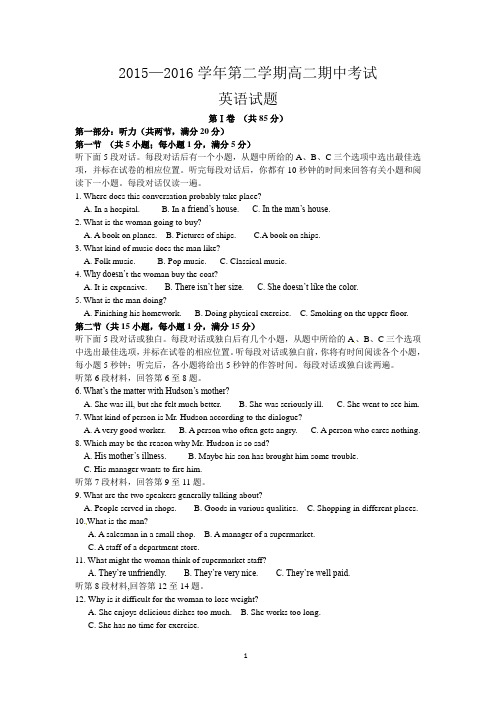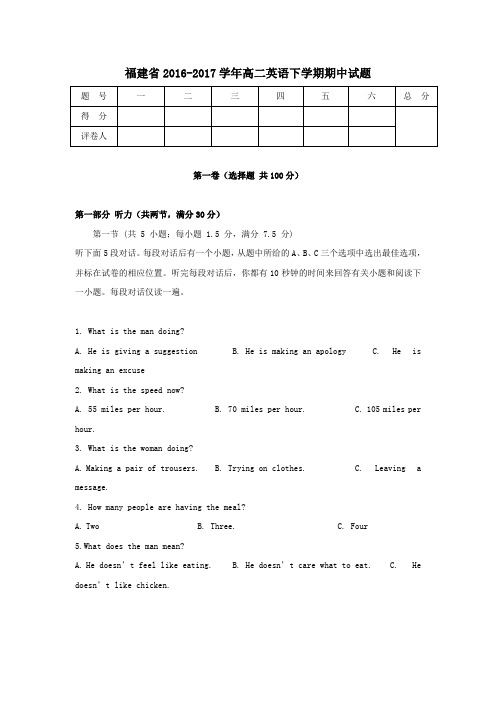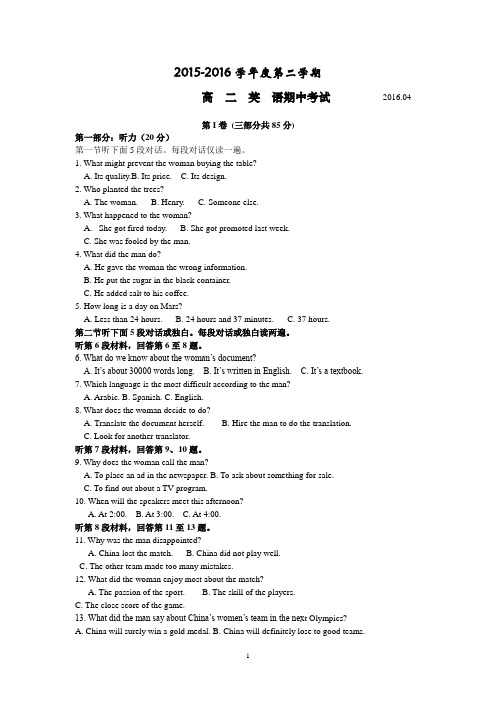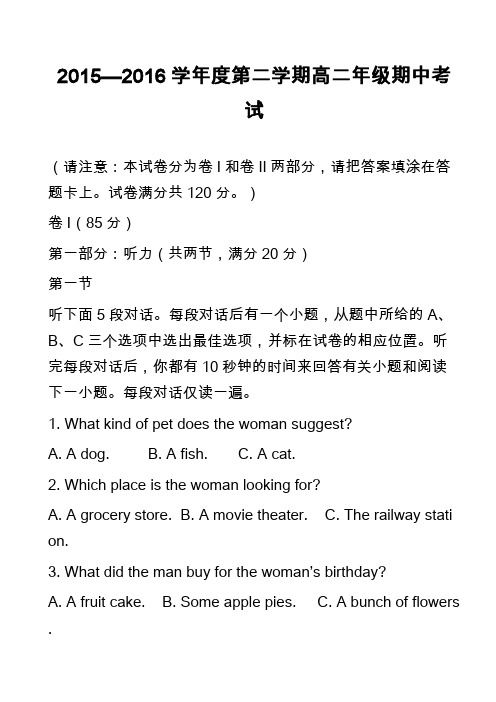【英语】福建省福州市五校2015-2016学年高二下学期期中联考试题
福建师大附中2015-2016学年高二下学期期中考试英语试题含答案试题

福建师大附中2015-2016学年第二学期期中模块测试高二英语(完卷时间:120分钟;满分:150分)第Ⅰ卷(共84分)(请将你的选项,按序号填涂在答题卡上。
)第一部分:听力(共20题;每小题1分, 满分20分)第一节(共5小题;每小题1分, 满分5分)听下面5段对话。
每段对话后有一个小题,从题中所给的A、B、C三个选项中选出最佳选项,并标在试卷的相应位置。
听完每段对话后,你都有10秒钟的时间来回答有关小题和阅读下一小题。
每段对话仅读一遍。
1. What is the weather like now?A. Cold.B. Cloudy.C. Rainy.2. What are the speakers mainly talking about?A. A lecture.B. A course.C. A hall.3. Where are the speakers?A. On a bus.B. On a plane.C. In a car.4. When is the man meeting the woman tomorrow?A. At 1: 00 a.m.B. At 11:00 a.m.C. At 2:00 p.m.5. Which shop are the speakers going to first?A. The chemist’s.B. The sports shop.C. The bookshop.第二节(共15小题;每小题1分, 满分15分)听下面5段对话或独白。
每段对话或独白后有几个小题,从题中所给的A、B、C三个选项中选出最佳选项,并标在试卷的相应位置。
听每段对话或独白前,你将有时间阅读各个小题,每小题5秒钟;听完后,各小题给出5秒钟的作答时间。
每段对话或独白读两遍。
听第6段材料,回答第6、7题。
6. What is the probable relationship between the speakers?A. Salesman and shopper.B. Waiter and customer.C. Neighbors.7. What does the woman need?A. Two eggs.B. Some coffee.C. A cake.听第7段材料,回答第8、9题。
2015-2016学年第二学期高二期中考试英语学科试题及参考答案

2015—2016学年第二学期高二期中考试英语试题第Ⅰ卷(共85分)第一部分:听力(共两节,满分20分)第一节(共5小题;每小题1分,满分5分)听下面5段对话。
每段对话后有一个小题,从题中所给的A、B、C三个选项中选出最佳选项,并标在试卷的相应位置。
听完每段对话后,你都有10秒钟的时间来回答有关小题和阅读下一小题。
每段对话仅读一遍。
1. Where does this conversation probably take place?A. In a hospital.B. In a friend‟s house.C. In the man‟s house.2. What is the woman going to buy?A. A book on planes.B. Pictures of ships.C.A book on ships.3. What kind of music does the man like?A. Folk music.B. Pop music.C. Classical music.4. Why doesn‟t the woman buy the coat?A. It is expensive.B. There isn‟t her size.C. She doesn‟t like the color.5. What is the man doing?A. Finishing his homework.B. Doing physical exercise.C. Smoking on the upper floor.第二节(共15小题,每小题1分,满分15分)听下面5段对话或独白。
每段对话或独白后有几个小题,从题中所给的A、B、C三个选项中选出最佳选项,并标在试卷的相应位置。
听每段对话或独白前,你将有时间阅读各个小题,每小题5秒钟;听完后,各小题将给出5秒钟的作答时间。
每段对话或独白读两遍。
福建省2016-2017学年高二第二学期期中英语试卷

福建省2016-2017学年高二英语下学期期中试题第一卷(选择题共100分)第一部分听力(共两节,满分30分)第一节 (共 5 小题;每小题 1.5 分,满分 7.5 分)听下面5段对话。
每段对话后有一个小题,从题中所给的A、B、C三个选项中选出最佳选项,并标在试卷的相应位置。
听完每段对话后,你都有10秒钟的时间来回答有关小题和阅读下一小题。
每段对话仅读一遍。
1. What is the man doing?A. He is giving a suggestionB. He is making an apologyC. He is making an excuse2. What is the speed now?A. 55 miles per hour.B. 70 miles per hour.C. 105 miles per hour.3. What is the woman doing?A.Making a pair of trousers.B. Trying on clothes.C. Leaving a message.4. How many people are having the meal?A.TwoB. Three.C. Four5.What does the man mean?A.He doesn’t feel like eating.B. He doesn’t care what to eat.C. He doesn’t like chicken.第二节(共 15 小题;每小题 1.5 分,满分 22.5 分)听下面5段对话或独白。
每段对话或独白后有几个小题,从题中所给出的A、B、C三个选项中选出最佳选项,并标在试卷的相应位置。
听每段对话或独白前,你将有时间阅读各个小题,每小题5秒钟;听完后,各小题将给出5秒钟的作答时间。
每段对话或独白读两遍。
听第6段材料,回答第6至7题。
6.Who is the woman?A.A hotel staff.B. A bank clerk.C. A restaurant manager.7.Why is the man at the hotel?A. To hold a business meeting.B. To eat at the restaurant.C. To spend his holidays听第7段材料,回答第8至10题。
福建省2016-2017学年高二第二学期期中英语试卷

福建省2016-2017学年高二英语下学期期中试题第一卷(选择题共100分)第一部分听力(共两节,满分30分)第一节 (共 5 小题;每小题 1.5 分,满分 7.5 分)听下面5段对话。
每段对话后有一个小题,从题中所给的A、B、C三个选项中选出最佳选项,并标在试卷的相应位置。
听完每段对话后,你都有10秒钟的时间来回答有关小题和阅读下一小题。
每段对话仅读一遍。
1. What is the man doing?A. He is giving a suggestionB. He is making an apologyC. He is making an excuse2. What is the speed now?A. 55 miles per hour.B. 70 miles per hour.C. 105 miles per hour.3. What is the woman doing?A.Making a pair of trousers.B. Trying on clothes.C. Leaving a message.4. How many people are having the meal?A.TwoB. Three.C. Four5.What does the man mean?A.He doesn’t feel like eating.B. He doesn’t care what to eat.C. He doesn’t like chicken.第二节(共 15 小题;每小题 1.5 分,满分 22.5 分)听下面5段对话或独白。
每段对话或独白后有几个小题,从题中所给出的A、B、C三个选项中选出最佳选项,并标在试卷的相应位置。
听每段对话或独白前,你将有时间阅读各个小题,每小题5秒钟;听完后,各小题将给出5秒钟的作答时间。
每段对话或独白读两遍。
听第6段材料,回答第6至7题。
6.Who is the woman?A.A hotel staff.B. A bank clerk.C. A restaurant manager.7.Why is the man at the hotel?A. To hold a business meeting.B. To eat at the restaurant.C. To spend his holidays听第7段材料,回答第8至10题。
福建省泉州市五校2015_2016学年高二英语下学期期中试题

2015-2016学年福建省泉州市五所重点学校下学期期中考试英语试题卷第一部分:听力(共两节,满分30分)第一节(共5小题;每小题1.5分,满分7.5分)1.What does Tom plan to do next week?A.To make a robotB.To enter a competition.C.To surprise the woman.2.What is the woman?A.A waitress.B.A tour guide.C.A saleswoman.3.What is the woman’s problom?A.She forgot her seat number.B.She got on the wrong train.C.She lost her train ticket.4.Why has the man stopped exercising?A.He is busy moving house.B.He lives far away from the gym.C.He dislikes going to gym alone.5.How is Janet probably feeling now?A.Disappointed.B.Confused.C.Stressed.第二节(共15小题;每小题1.5分,满分22.5分)听第6段材料,回答第6、7题。
6.How long is the woman going to stay at the hotel?A.Two nights.B.Three nights.C.Four nights.7.Why are the prices for the two rooms different?A.The rooms are different in size.B. The rooms have different views.C.The rooms are of different shapes.听第7段材料,回答第8、9题。
2015-2016学年高二下学期期中考试英语试题

2015-2016学年度第二学期高二英语期中考试2016.04第I卷(三部分共85分)第一部分:听力(20分)第一节听下面5段对话。
每段对话仅读一遍。
1. What might prevent the woman buying the table?A. Its quality.B. Its price.C. Its design.2. Who planted the trees?A. The woman.B. Henry.C. Someone else.3. What happened to the woman?A.She got fired today.B. She got promoted last week.C. She was fooled by the man.4. What did the man do?A. He gave the woman the wrong information.B. He put the sugar in the black container.C. He added salt to his coffee.5. How long is a day on Mars?A. Less than 24 hours.B. 24 hours and 37 minutes.C. 37 hours.第二节听下面5段对话或独白。
每段对话或独白读两遍。
听第6段材料,回答第6至8题。
6. What do we know about the woman’s document?A. It’s about 30000 words long.B. It’s written in English.C. It’s a textbook.7. Which language is the most difficult according to the man?A. Arabic.B. Spanish.C. English.8. What does the woman decide to do?A. Translate the document herself.B. Hire the man to do the translation.C. Look for another translator.听第7段材料,回答第9、10题。
2015-2016学年度第二学期高二期中考试试卷

2015---2016学年度第二学期高二期中考试英语试卷第Ⅰ卷(选择题,共100分)第一部分:单项选择(共30小题,每小题1 分,满分30分)1.He didn’t make_____ clear when and where the meeting would be held.A. thisB. thatC. itD. these2. I have a lot of readings _____before the end of this term.A. completingB. to completeC. completedD. being completed3. It _____me three days _____what I want.A. takes; findingB. pay; findC. spend; findingD. takes ; to find4. Not until he left his home_____ to know how important the family was for him.A. did he beginB. had he begunC. he beganD. he had begun5. Your hard work_____ your great progress in English.A. contributed toB. resulted fromC. depended onD. lied in6. The government is_____ to everyone to save water.A. askingB. appealingC. declaringD. announcing7. Your medical records are strictly _____.A. confidentialB. confidentC. confidentiallyD. confidence8. She remained _____for a while after the movie ended, which made others_____.A. sitting; puzzlingB. sitted; puzzledC. seated; puzzledD. seated; puzzling9. You look well. The air and the sea foods in Sanya must _______you, I suppose.A. agree withB. agree toC. agree onD. agree about10. A clean environment can help the city _____ the Olympics, which in turn will promote its economic development.A. wish forB. long forC. bid forD. stand for11. She has _____a lot of things so she knows exactly how to deal with such a person.A. gone throughB. got throughC. gone byD. gone into12. He has been_____ from his job for carelessness.A. dismissedB. prevented D. discharged D. discouraged13. She was_____ the meeting.A. absent inB. absent-mindedC. absent fromD. absent14. Either you or the headmaster_____ the prize to these gifted students at the meeting.A. is handing outB. are to hand outC. are handing outD. is to hand out\15. Before her stood a terrible man; Linda could do nothing_____.A. but to be cryingB. but cryC. but to cryD. but crying16. He has always insisted that he_____ Dr Turner instead of Mr Turner.A. will be calledB. callC. have been calledD. should be called17. House prices vary from place to place and are usually high_____ there are famous school.A. whereB. sinceC. whenD. whether18.----- I don’t mind how you do it _____you finish the painting on time.----- OK. I see.A. as well asB. as far asC. as long asD. as fast as19. Exhausted _____ she was, she managed to run across the finishing line.A. althoughB. whileC. asD. since20. _____ enough time and money, I’m sure I will do the work perfectly.A. GivenB. GivingC. Having beenD. Having given21. The book will be _____ to students of history.A. of great valueB. of great valuableC. of greatly valueD. of great values22. The news shocked be public, _____to great concern about students’ safety at school.A. having ledB. ledC. leadingD. to lead23. Jack is a great talker. It’s high time that he _____ something instead of just talking.A. will doB. has doneC. doD. should do24. _____ weak we are, we human beings are not completely powerless in natural disasters.A. HoweverB. WhateverC. No matterD. whichever25.Rather than _____ up his marriage, he preferred to tell his wife everything.A. to risk to breakB. to risk breakingC. risk to breakD. risk breaking26. ----The last one_____ pays the meal.----Agreed!A. arrivedB. arrivesC. to arriveD. arriving27. I hear they’ve promoted Tom, but he didn’t mention_____ when we talked on the phone.A. to promoteB. having been promotedC. having promotedD. to be promoted28. The good thing about children is that they _____ very easily to new environments.A. adaptB. adoptC. appealD. apply29. When I saw Jane , I stooped and smiled, but she _____ me, and walked on.A. refusedB. ignoredC. deniedD. missed30. He said he would_____ me to Mr Li as his assistant but he didn’t.A. commentB. suggestC. commandD. recommend第二部分:阅读理解(共两节,满分40分)第一节:(共15小题;每小题2分,共30分)阅读下列短文,从每题所给的ABCD四个选项中选出最佳答案。
高中英语真题:2015—2016学年度第二学期高二年级期中考试

2015—2016学年度第二学期高二年级期中考试(请注意:本试卷分为卷I和卷II两部分,请把答案填涂在答题卡上。
试卷满分共120分。
)卷I(85分)第一部分:听力(共两节,满分20分)第一节听下面5段对话。
每段对话后有一个小题,从题中所给的A、B、C三个选项中选出最佳选项,并标在试卷的相应位置。
听完每段对话后,你都有10秒钟的时间来回答有关小题和阅读下一小题。
每段对话仅读一遍。
1. What kind of pet does the woman suggest?A. A dog.B. A fish.C. A cat.2. Which place is the woman looking for?A. A grocery store.B. A movie theater.C. The railway stati on.3. What did the man buy for the woman’s birthday?A. A fruit cake.B. Some apple pies.C. A bunch of flowers .4. What is the relationship between the speakers?A. Classmates.B. Parent and child.C. Teacher and stud ent.5. Where is the woman?A. In a car.B. In an elevator.C. In a bookstore.第二节听下面5段对话或独白。
每段对话或独白后有几个小题,从题中所给的A、B、C三个选项中选出最佳选项,并标在试卷的相应位置。
听每段对话或独白前,你将有时间阅读各个小题,每小题5秒钟;听完后,各小题将给出5秒钟的作答时间。
每段对话或独白读两遍。
听第6段材料,回答第6、7题。
6. What does the man offer to do for the woman?A. Stay home with her.B. Make her some food.C. Drive her to a frie nd’s house.7. How did the woman probably get sick?A. From John.B. From the man.C. From her colleag ue.听第7段材料,回答第8、9题。
- 1、下载文档前请自行甄别文档内容的完整性,平台不提供额外的编辑、内容补充、找答案等附加服务。
- 2、"仅部分预览"的文档,不可在线预览部分如存在完整性等问题,可反馈申请退款(可完整预览的文档不适用该条件!)。
- 3、如文档侵犯您的权益,请联系客服反馈,我们会尽快为您处理(人工客服工作时间:9:00-18:30)。
闽侯二中、闽清高级中学、永泰二中、连江侨中、长乐二中2015-2016学年下学期高二半期考英语联考试卷考试时间120分钟满分150分命题:林晓华校对:谢道樑第I卷I. 听力(共两节,满分30分)第一节(共5小题;每小题1.5分,满分7.5分)请听下面5段对话,选出最佳选项。
1. What did the woman do last Saturday?A. She went swimming.B. She did laundry.C. She went shopping.2. What food does the woman dislike?A. Spicy food.B. Sweet food.C. Salty food.3. How many rooms does the woman have in her apartment?A. 5.B. 4.C. 3.4. What colour hat does the man‟s wife have?A. Pink.B. Yellow.C. Blue.5. Where are the two speakers most probably?A. At a taxi station.B. At a bus stop.C. At a railway station.第二节(共15小题; 每小题1.5分,满分22.5分)请听下面5段对话或独白,选出最佳选项。
请听第6 段材料,回答第6、7题。
6. What is the man going to do tonight?A. Go bowling.B. Buy a football.C. Watch a game.7. When does the woman usually finish her work?A. By 5:00.B. By 5:30.C. By 6:00.请听第7段材料,回答第8、9题。
8. When will the man be at 6pm on Mondays?A. At the Kings hotel.B. At a computer center.C. At a university.9. What does the man do at noon on Tuesdays?A. He takes a computer class.B. He works as a tour guide.C. He has English class with the woman.请听第8段材料,回答第10至12题。
10. When did the woman have her daughter?A. Five years ago.B. Six months ago.C. Five months ago.11. Where is the woman living now?A. In Miami.B. In New York.C. In Washington.12. What is the woman‟s plan in a few years?A. She will go to work in a school.B. She wants to return to work in a bank.C. She will stay at home to teach her daughter.请听第9段材料,回答第13至16题。
13. What will the woman do in Thailand?A. Work as an English teacher.B. Travel around the country.C. Work in the rose business.14. Where does the woman think Chiang Mai is?A. In the mountains.B. Near the ocean.C. Near the forest.15. How long does the rainy season last in Chiang Mai?A. About three months.B. About four months.C. About Five months.16. What do we know about the man?A. He comes from Thailand.B. He is fond of hiking.C. He likes traveling by train. 请听第10段材料,回答第17至20题。
17. Which job was included in the speaker‟s job list when he was in college?A. Doctor.B. Judge.C. Writer.18. How far did the speaker cycle in the US with his son?A. 300 miles.B. 2,500 miles.C. 25,000 miles.19. What do we know about the speaker?A. He retired in 2013.B. He has a sixteen-year-old son.C. He raised money for children.20. What does the man want to tell us?A. Practice makes perfect.B. It‟ easier said than done.C. Where there is a will, there is a way.II. 阅读理解(共两节,满分40分)第一节(共15小题;每小题2分,满分30分)阅读下列短文,从每题所给的四个选项(A、B、C和D)中,选出最佳选项。
AI travel a lot, and I find out different “styles” of directions every time I ask “How can I get to the post office?”Foreign tourists are often confused in Japan because most streets there don‟t have names; in Japan, people use landmarks in their directions instead of street names. For example, the Japanese will say to travelers, “Go straight down to the corner. Turn left at the big hotel and go past a fruit market. The post office is across from the bus stop.”In the countryside of the American Midwest, there are not usually many landmarks. There are no mountains, so the land is very flat; in many places there are no towns or buildings within miles. Instead of landmarks, people will tell you directions and distances. In Kansas or Iowa, for example, people will say, “Go north two miles. Turn east, and then go another mile.”People in Los Angeles, California, have no idea of distance on the map; they measure distance in time, not miles. “How far away is the post office?” you ask. “Oh,” they answer, “it‟s about five minutes from here.” You say, “Yes, but how many miles away is it?” They don‟t know.It‟s true that a person doesn‟t know the answer to your question sometim es. What happens in such a situation? A New Yorker might say, …Sorry, I have no idea.” But in Yucatan, Mexico, no one answers “I don‟t know.” People in Yucatan believe that “I don‟t know” is impolite. They usually give an answer, often a wrong one. A tourist can get very, very lost in Yucatan!21. When a tourist asks the Japanese the way to a certain place they usually _________.A. describe the place carefullyB. refer to recognizable buildings and placesC. show him a map of the placeD. tell him the names of the streets22. Which is the place where people measure distance in time?A. New York.B. Kansas.C. Los Angeles.D. Iowa.23. People in Yucatan may give a tourist a wrong answer ________.A. in order to save timeB. as a testC. for funD. so as to be polite24. What can we infer from the text?A. It‟s useful for travelers to know how to ask the way properly.B. People have similar understandings of politeness.C. It‟s important for travelers to understand cultura l differences.D. New Yorkers are generally friendly to visitors.BTowards evening, Jennifer was walking on the beach with a gentle breeze blowing through her hair. Looking up at the golden red sun ball, she was surprised by its color, deep red in the middle, softly fading into yellow. She could hear nothing but the waves and the seagulls flying up above in the sky.The atmosphere relaxed her. This was what she needed. “It‟s getting late,” she thought, “I must go home. My parents will be wondering where I am.” She wondered how her parents would react when she got home after the three days she was missing. She kept on walking, directing herself to bungalow 163, where she spent every summer holiday. The road was deserted. She walked slowly and silently. Just in a few hundred meters, she would have been safe in her house.It was really getting dark now. She wished she had her favorite coat on. It might keep her really warm. She imagined having it with her. This thought dissipated(消散) when she finally saw her front door. It seemed different. Nobody had taken care of the outside garden for a few days. She was shocked: her father was usually so strict about keeping everything clean and tidy, and now…She entered the house. First, she went into the kitchen and saw a note written by her father, “Dear Ellen, there‟s some coffee ready; I went looking.” But where was Ellen? On the right side of the hallway was her parents‟ room. She went in and saw her. Her mother, lying on the bed, was sleeping. Her face looked so ti red, as if she hadn‟t slept for days. She was really pale. Jennifer would have wanted to wake her up, but she looked too tired. So Jennifer just fell asleep beside her. When Jennifer woke up something was different. She wasn‟t in her mother‟s room and she wasn‟t wearing the old clothes she ran away in. She was in her cozy bed in her pajamas(睡衣).It felt so good being back home. Suddenly she heard a voice. “Are you feeling better now, dear? You know you got us very, very scared.”25. The author mentions the views of the beach in Para.1 in order to __________.A. tell us the time of the storyB. show Jennifer‟s eased mindC. show Jennifer‟s lonelinessD. indicate the beauty of nature26. Jennifer decided to go home because __________.A. it was getting coldB. she began to miss her parentsC. she realized her parents were worriedD. she knew nobody would take care of the garden27. What can we infer from the passage?A. Jennifer went home to fetch her favorite coat.B. Jennifer‟s father was so worried that he couldn‟t take care of the outside garden.C. Jennifer understood why the outside garden was left uncared for.D. Jennifer‟s father used to be too strict with her.28. Which of the following shows the change of Jennifer‟s feeling?A. Relaxed→Lonely→Tired→Upset.B. Angry→Relaxed→Fearful→Comfortable.C. Fearful→Relaxed→Cheerful→Lonely.D. Relaxed→Anxious→Shocked→Comfortable.CWe‟ve always limited “screen time” at home: no screen time before two years of age, and only occasional educational DVDs after that. Researchers have found a connection between screen time and a host of behavioral and physical problems. Some children have become so addicted to iPads and othe r tablet devices (平板电脑装置) that their parents have even sought out treatment.So, should I be perturbed about the increasing dependence on technology in our schools? In addition to a weekly computer class, my first-grade daughter spends much of her instructional school day in front of the “smart board”. And now, school districts acr oss the country are talking about replacing textbooks with tablets.There are several factors that need careful consideration. Important distinctions must be drawn between television screen time (yes, even educational programming), which is a mostly passive medium, and tablet screen time, which is more interactive (互动的). Another important factor is the age of the child. All people need human interaction, but babies and small children need it most of all. Studies have suggested that tablets may help improve reading and writing abilities in school-aged children, however, plus they help children with autism (a mental disorder)communicate.Tablets in the classroom could replace expensive and heavy textbooks, allow children to make and read notes more easily, providing interactive functions and help track progress. When I was a child, I could hardly carry my backpack up my driveway — we could avoid a lot of back problems by using one light and thin tablet instead of huge textbooks.Beyond common concerns (what happens if the tablet is lost, stolen or broken?), I do worry about that we are rushing toward a brave new world of technology without considering what we might lose. If our children spend too much time on tablets, they run the risk of becoming addicted and missing out on a lot of what the world has to offer, especially in a time when schools are cutting art, music and gym. Human brains need real-world connections, touchable sensations and even some downtime. Tablets can be a part of child‟s education, but we have to guard against these devices taking over.29. The underlined word “perturbed” in Paragraph 2 is closest in meaning to “_______”.A. curiousB. happyC. excitedD. worried30. According to Paragraph 3, allowing very young children to use tablets _______.A. is worth a tryB. may be harmfulC. helps improve their learning skillsD. offers them more human interactions31. The author mentions her childhood experience to _______.A. express her support for traditional educationB. stress the importance of taking notesC. show the disadvantages of textbooksD. describe her happy childhood32. Which may be the author‟s opinion on tablets?A. They‟re helpful only in a limited way.B. They are too expensive for most students.C. They excite students‟ interest in learning.D. They improve the effectiveness of education.DWhich animal has the fastest snapping jaw (突然合住的颚)? If you‟re guessing a shark or perhaps a larger animal, you‟ll have to think smaller. The trap-jaw ant, which lives in Central and South America, moves its mouth parts at 35 to 63 meters per second. Another way to think aboutthis is that the ant‟s jaws close at 125 to 233 kilometers per hour. That‟s 2,300 times faster than the blink of an eye.Scientists were able to measure the amazing jaw speed using high-speed video techniques. Sheila Patek, a biologist, says the key is that the jaws have a springy (有弹性的) system, which is critical in getting explosive (爆发性的) speeds.Consider a bow and arrow. If you try to throw an arrow with your arm, it won‟t go very far. If you use a bow, elastic energy stored in the bow is freed almost immediately when you let go of the arrow with your finger. That‟s exactly what really fast organisms are doing.Maybe even more amazing than how fast these ants grab food or even enemies is how they use this same energy to move. As the ant closes its jaws, it uses them to push off the ground — all faster than the eye can see without slow motion video. A snap of the jaw can send an ant up to 8.3 centimeters into the air. That‟s like someone who is 1.7 meters jumping 13 meters high! Not only can they quickly escape from enemies, but often a group of ants will start jumping all at once. It would be hard for their enemies to grab just one.33. The fast speed of the trap-jaw ants‟ jaws lies in ______.A. their light bodiesB. their springy systemsC. their living environmentD. the length of their jaws34. What does the passage use “a bow and arrow” as an example to show?A. How an arrow gets so much energy to fly.B. Why the trap-jaw ants have a springy system.C. Why the trap-jaw ants‟ jaws move so fast.D. How a bow and arrow works.35. According to the passage, the trap-jaw ants‟ jaws keep them safe because ______.A. they can catch their enemies easily with their jawsB. their jaws make them difficult to recognizeC. their jaws help them to find food easilyD. their jaws help them to escape from their enemies第二节(共5小题;每小题2分,满分10分)根据短文内容,从短文后的选项中选出能填入空白处的最佳选项。
